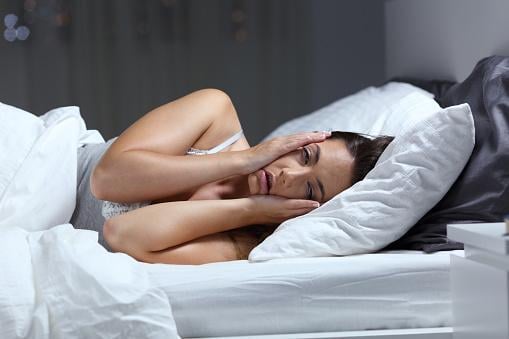
Introduction:
Snorers are at risk for major health issues, but they are not the only ones with problems. Snoring also has debilitating effects on the snorer’s spouse and family members who are in earshot of the offender. They too suffer from sleep deprivation.
You may find yourself wondering how to help someone stop snoring. Millions do...
Statistics say snoring negatively affects many relationships. In a National Sleep Foundation poll, 50% of people at risk for obstructive sleep apnea said that snoring and daytime drowsiness caused problems in their relationship.
A research study in 2014 revealed that 13.9% of couples sleep apart every night, and partner snoring accounts for half of those.
So, what's the answer to how to stop someone from snoring? Do you yell at them, wake them up, or send them to the sofa? Or is there a more humane way to deal with the aggravations of living with a snorer?
Actually, there are many ways to help a snorer beat the rap. If your partner snores and you deal with daytime fatigue because you are not getting enough sleep, you can try these snoring solutions and see what works for you–and the snorer.
If none of these suggestions make your sleep partner stop snoring, it will be time to bring in a medical professional for some personal consultations. Some of the steps below do involve medical treatment, and those of course require medical approval. But even if you do not consider major procedures like neck surgery, a doctor can help with initial evaluations to determine your snorer's health conditions.
Let’s start with the easier and more obvious solutions.
4 Proven Tips to Combat Snoring
Certain habits, practices and environmental factorscontribute to snoring, but below we offer simple adjustments to help both you and your snorer deal with snoring and its devastating effects on sleep...
#1. Provide a good sleep environment
You want to make sure the snorer is practicing good sleep hygiene. This involves several practices, starting with maintaining a good sleep environment. Remember, your snorer has been getting poor quality sleep as well—better sleep hygiene will help ensure they sleep better in spite of their snoring.
Sleep positions are important. Snoring is at its worst when the sleeper is on his or her back. This sleeping position allows the soft tissues in the back of the throat to more easily collapse and block the airways. Getting the snorer to change positions, to sleep on his or her side, is a good first step to prevent snoring.
One trick often used to correct posture is the tennis ball solution. A tennis ball is sewn into a tee-shirt pocket, and the snorer puts the tee-shirt on backwards. When rolling onto his or her back, the tennis ball makes it uncomfortable. A similar solution would be a body-length pillow up against the back of the snorer to prevent rolling onto the back.
The second thing to consider is the position of the head relative to the pillows in use. Raising the head a few inches can help stop or reduce the annoying snoring sound. There are specially designed pillows with different levels of firmness one can try. Some are designed specifically to support and relax neck muscles.
Mattresses should be comfortable, and beds should be big enough. Some beds can raise the position of the sleeper, and this can help reduce snoring sounds and improve sleep quality.
Environmental solutions
There is also the possibility that allergens in the air are affecting snoring as well. To avoid this, keep mattresses, pillows, and covers as clean as possible.
If the nasal and throat tissues and airways are moist, it reduces snoring. You can keep the bedroom moist with a humidifier. You can also have the snorer breathe steaming saltwater or rinse the nose with a saline solution in a net pot. A hot shower or steam is another way to breathe in moist air before sleeping.
Nasal strips are often the first step snorers try in order to stop snoring. These flexible strips applied outside the nose, open the nostrils or nasal passages which improves airflow through the nose.
The strips may provide temporary relief of obstructed breathing due to occasional nasal blockage, sinus congestion or colds and flu—and by making it easier to breathe through the nose, they may also help to temporarily reduce mild snoring. There isn't much evidence, however, that they are an effective solution for those with a more chronic snoring issue.
All too often, the snoring "issue" is that the snoring is so bad, it's disrupting everyone's sleep. Making someone stop snoring is rarely easy—taking steps to make yourself more comfortable—and snore-proofed—is what's going to make sleeping with your snorer doable.
Light and sound
When it’s dark, our bodies prepare for sleep. That’s our circadian rhythm at work. The bedroom should be as dark as possible, with all electronic devices turned off.
A quiet room is advisable, too. If you have a partner that snores, you would no doubt love a quiet room. The only sounds that might be helpful are a white noise like the whir of a fan, or pink noise like a gentle waterfall. These sounds can help the snorer have a better night’s sleep by softening ambient noise that might otherwise wake them.
#2. Suggest anti-snoring devices
For the snorer
The most-recognized device for stopping snoring, addresses the problem directly. It is called a CPAP machine. CPAP=Continuous Positive Airway Pressure.
A CPAP machine produces air pressure to keep the airways open during sleep. There are variations of this machine that produce different levels of pressure and/or actually sense the breathing patterns of the snorer and work to complement that pattern by increasing or decreasing the pressure as needed.
The CPAP device should only be used under the recommendation of a physician—and probably only after performing a sleep study.
For partners of snorers
There are devices that might help reduce or eliminate the snoring sound for partners of snorers. Earplugs for snoring is one option—but not a very effective one. Over the counter earplugs are no match for heavy snoring.
A better solution is noise masking earbuds worn by the bed partner or family member of the snorer in order to block out the noise completely. Earbuds for snoring successfully mask unwanted snoring noise with a more pleasant sound.
SoundOff earbuds use a calming pink noise to mask those sleep-destroying snore noises. Our technology incorporates both active and passive noise masking—it replaces the unwanted sound—and also blocks snoring and other sounds from coming into your ear canal. The snoring noise is simply gone.
#3. Make lifestyle changes to help relieve snoring
Apart from the medically reviewed medical appliances, there are several things the snoring partner can do every day to reduce chances of snoring. Changes in lifestyle go a long way in preventing sleep disorders and in increasing sleep quality.
Excess weight is also linked to snoring. A diet and exercise program can lead to weight loss and thus a reduction in neck tissue fat around the throat leading to airways. Neck size is an important consideration when assessing Sleep Apnea. This is because neck fat compresses the upper airway making snoring more likely.
Recommend that the snorer not eat a heavy meal before bedtime and refrain from drinking alcohol or caffeine within a few hours of bedtime. Coffee, tea, and sodas with caffeine are stimulants and alcohol and sedatives can cause the soft tissues to relax during sleep thus leading to more snoring.
You can also suggest that the snorer keep well hydrated during the day. This is a good general health practice, anyway, and will help all bodily functions perform better.
Throat exercises can help to strengthen the muscles of the upper respiratory system. These exercises can be done in almost any setting – while studying or commuting, for example.
Travelers who cross time zones can prepare for the inevitable jet lag that follows. You may want to suggest that the traveler go to bed an hour or two earlier or later depending on the direction of travel to get accustomed to the new schedule. This will help adjust the person’s circadian rhythm for a more natural sleep pattern at the new location.
#4. Recommend a surgery consultation for your snorer
Implement good sleep hygiene. Make lifestyle changes. Lose weight, sleep on your side, avoid alcohol, keep nasal passages clean, quit smoking, try anti-snoring devices. But if the problem persists, what do you do next?
The only solution at this point may be surgery. Recommending a consultation with a physician will be in the best interests of the snorer. If a sleep study is performed and sleep apnea is identified, then a CPAP solution will avoid surgery.
But if the problem is found to be structural, then surgery may be the only answer to stop the issue. There are different surgeries recommended for different causes. Traditional surgery removes tissues that are blocking the airways and/or corrects any abnormalities in the nose, such as deviated septum which may cause mouth breathing.
Laser-assisted surgery of the uvula is also possible. This is the removal of the hanging tissue at the back of the throat and small cuts in the soft palate. The healing process makes the palate stiffer and resists snoring.
Tonsillectomies and adenoidectomies are often performed in children who have chronic sore throats. The purpose of the surgery is not to cure snoring but is a byproduct of the surgery for those children who do snore.
So, pulling that pillow over your head may give you a brief peace of mind. But for a long-term, and hopefully permanent, solution, you can try these steps and instructions for how to help someone stop snoring.

































